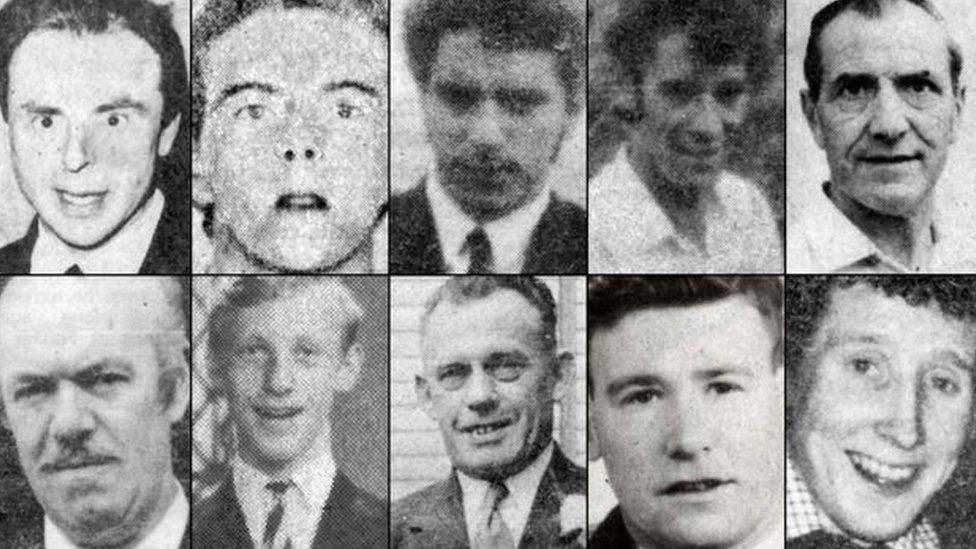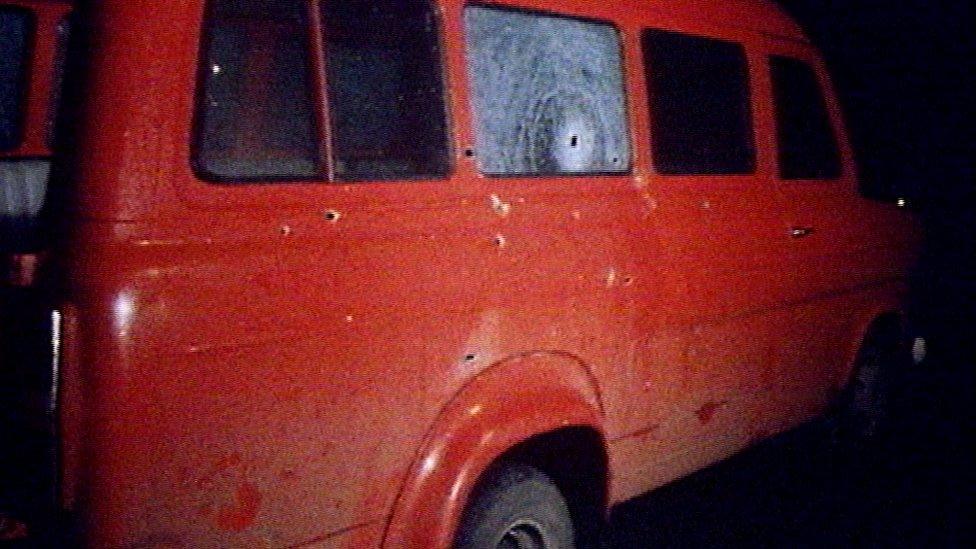Kingsmills inquest: Police 'didn't talk to massacre witness'
- Published

Ten workmen, aged from 19 to 58, were murdered by the IRA at Kingsmills in 1976
A witness in the Kingsmills inquest has revealed that despite being the first person at the scene of the killings he was never interviewed by the police.
Charles Hughes was excused from having to give evidence in person because of ill-health, so his statement was read to the court.
The inquest into the IRA murder of 10 Protestant workmen, 41 years ago, is continuing at Belfast Coroners' Court.
The workmen were shot dead after their van was stopped.
Mr Hughes told how he had been to Newry to collect building supplies with his brother-in-law and that they were on their way home to Camlough.
He described seeing the workmen's van stationary across the road and when he got out he saw it was surrounded by dead bodies.
He said he saw a two-tone mini car doing a three point turn. A woman was driving and Richard Hughes - the sole Catholic who had been on the minibus - was in the passenger seat.
Charles Hughes said his brother-in-law drove to the nearest farm for help.
When he'd gone, Mr Hughes said there was "no noise at all". He said he was alone with the bodies for what felt like an eternity, but was probably no longer than 15 minutes..
Soon others came and a woman referred to as Nurse Kennedy checked the bodies for life. He said he remembered her hearing a groan from the sole survivor, Alan Black, and then shouting that one was alive.
Charles Hughes said he made himself known to the police when they arrived and remained at the scene until 20:30 that evening. He said that every time the RUC arranged to take a statement they failed to turn up.
He never gave the statement until April 2016 - to the Police Ombudsman.
'Not a no-go area'
Earlier, a Ministry of Defence (MoD) witness told the inquest that there was no part of south Armagh that was considered to be a "no-go" area by the Army.
Known only as MoD witness two, the retired soldier spoke from behind a blue curtain and read from a statement
He outlined the security situation around Bessbrook barracks.
Witness two also outlined his role in the Royal Scots Guards during a four-month tour in 1976.
He also made reference to family concerns that the Army had been told not to go out on patrol on the night of the atrocity.
The witness said he could categorically state that this was not the case and that, at no time had soldiers remained in the barracks in such situations. He said the Army would not tolerate any "no-go" areas.

The victims were shot after IRA gunmen stopped their bus as they travelled home from work
The court heard that the mother of John McConville, one of the 10 killed, worked in the kitchens of the Bessbrook barracks and had been told by an officer a few years later that the Army had been told not to go out on the night of the attack.
In response, MoD witness two said every person would have been deployed at the time, saying such a claim "just doesn't stack up".
The witness described his role as an operations manager at Bessbrook barracks.
He said he was an implementer of Army strategy, not the planner.
He told the court that prior to the Kingsmills shootings, there had been several tit-for-tat killings, including a bombing of a pub in Camlough and the killing of the Reavey brothers the day before.
He described the security situation at the time as "very intense" saying that the Army had deployed a large number of soldiers on the ground.
In his statement, MoD witness two also made reference to Robert Nairac, an Army officer abducted and murdered while on an undercover operation in South Armagh in 1977.
He said he had never met Robert Nairac.
The witness said he had checked with intelligence records and they showed that the officer had never visited Bessbrook Barracks.
When asked by a barrister representing one of the families if he was saying under oath that he had no knowledge of Captain Robert Nairac, he replied: "I have no knowledge of Robert Nairac full stop.
"I have never met him and don't know him".
- Published16 May 2017

- Published22 May 2017

- Published15 May 2017

- Published17 May 2017
